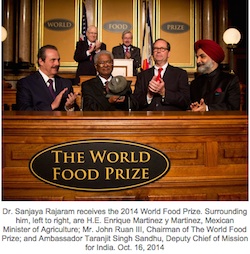The 2014 World Food Prize was awarded on World Food Day, October 16, 2014 to Dr. Sanjaya Rajaram, a wheat breeder who has developed more than 400 varieties of the crop. Born in a small village in India and now citizen of Mexico, Dr. Rajaram conducted the majority of his research in Mexico at the International Maize and Wheat Improvement Center (CIMMYT).
 Dr. Rajaram’s scientific research led to a prodigious increase in world wheat production – by more than 200 million tons. His crossing of winter and spring wheat varieties, which were distinct gene pools that had been isolated from one another for hundreds of years, led to his development of plants that have higher yields and dependability under a wide range of environments around the world. He also developed wheat varieties resistant to the rust disease that can wipe out entire fields, thus protecting the world’s food supply.
Dr. Rajaram’s scientific research led to a prodigious increase in world wheat production – by more than 200 million tons. His crossing of winter and spring wheat varieties, which were distinct gene pools that had been isolated from one another for hundreds of years, led to his development of plants that have higher yields and dependability under a wide range of environments around the world. He also developed wheat varieties resistant to the rust disease that can wipe out entire fields, thus protecting the world’s food supply.
“This award honors the resilience and innovative spirit of farmers in the developing world and the national agricultural systems,” Dr. Rajaram said as he accepted the award. “Without their contributions my research would not have been possible. The mission was – and the mission remains – to serve them.”
As the World Food Prize culminates the centennial year of its founder and Dr. Rajaram’s mentor, Dr. Norman Borlaug, it is especially fitting to recognize the impact of Dr. Rajaram’s achievements.
“Dr. Rajaram worked closely with Dr. Borlaug, succeeding him as head of the wheat breeding program at CIMMYT in Mexico, and then carried forward and expanded upon his work, breaking new ground with his own invaluable achievements. His breakthrough breeding technologies have had a far-reaching and significant impact in providing more food around the globe and alleviating world hunger,” said Amb. Kenneth M. Quinn, President of The World Food Prize. “Dr. Borlaug himself called Dr. Rajaram ‘the greatest present-day wheat scientist in the world’ and ‘a scientist of great vision.’ It is an honor to recognize Dr. Rajaram today for his development of an astounding 480 varieties of wheat, bred to offer higher yields, resistance to the catastrophic rust disease, and that thrive in a wide array of climates.”
